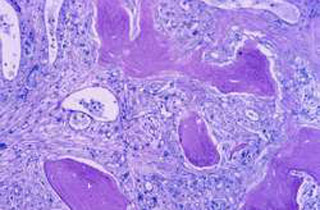Targeting a Rare Blood Cancer: Myelofibrosis
The FDA has approved a new molecularly targeted therapeutic called fedratinib for treating certain patients with a rare blood cancer called myelofibrosis.
The U.S. Food and Drug Administration (FDA) recently approved a new molecularly targeted therapeutic called fedratinib (Inrebic) for treating certain adults with a rare blood cancer called myelofibrosis.

Myelofibrosis is one of a group of blood cancers called chronic myeloproliferative neoplasms. According to the National Cancer Institute, there are six blood cancers considered chronic myeloproliferative neoplasms: chronic myelogenous leukemia, polycythemia vera, primary myelofibrosis, essential thrombocythemia, chronic neutrophilic leukemia, and chronic eosinophilic leukemia. In some cases, polycythemia vera and essential thrombocythemia progress to become myelofibrosis. For these patients, the disease is referred to as secondary myelofibrosis.
It is estimated that there are about 13,000 people living with myelofibrosis in the United States. Another 148,000 and 134,000 people are living with polycythemia vera and essential thrombocythemia respectively.
Myelofibrosis is a disease that usually develops slowly. Abnormal blood cells and fibers build up inside the bone marrow, leading to anemia, which in turn causes tiredness, weakness, and shortness of breath. In addition, to make up for the low number of blood cells being made in the bone marrow, the spleen begins to make blood cells, which causes the spleen to enlarge dramatically, a condition known as splenomegaly.
The likely outcome for patients diagnosed with myelofibrosis is estimated based on several risk factors. Patients with more than one risk factor — including being age 65 or older; having anemia; experiencing fever, night sweats, or weight loss; having high white blood cell counts; and having at least 1 percent of cells in the blood being cancer cells — are classed as having intermediate-2 risk disease. Patients with four or more risk factors are classed as high-risk.
Fedratinib was approved for the treatment of adults with intermediate-2 or high-risk primary or secondary (post-polycythemia vera or post-essential thrombocythemia) myelofibrosis.
In many patients with myelofibrosis, the disease is driven by mutations in the JAK2 gene. Fedratinib targets JAK2. It was approved for treating myelofibrosis after it was shown in a randomized phase III clinical trial to significantly reduce spleen volume and to reduce myelofibrosis-related symptoms for patients with intermediate-2 or high-risk primary or secondary myelofibrosis.
The FDA approval was rendered on Aug. 16, 2019.
